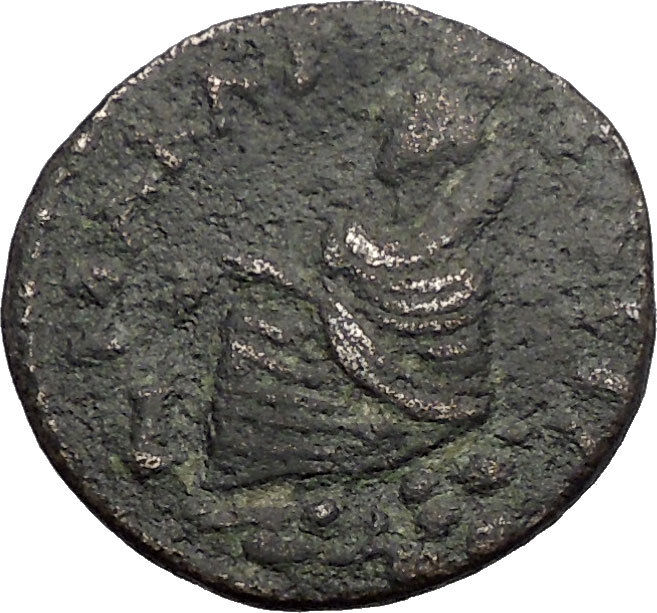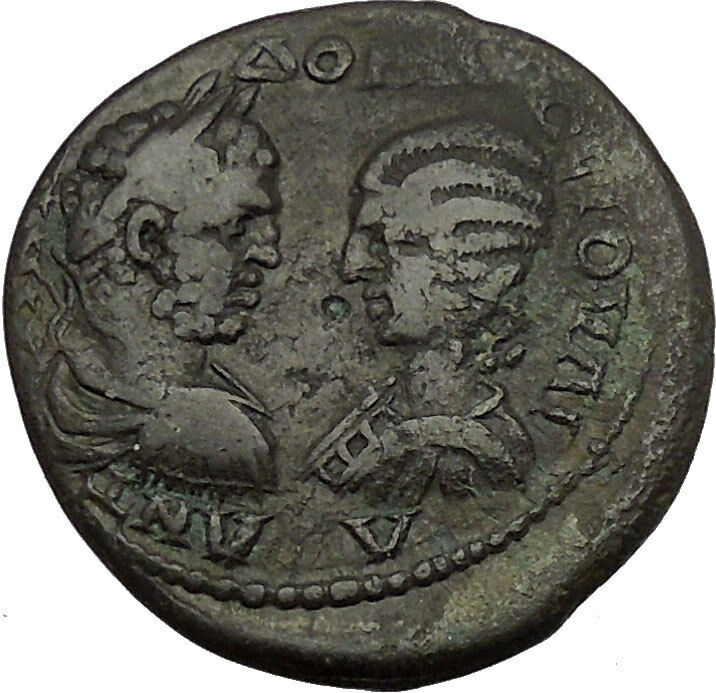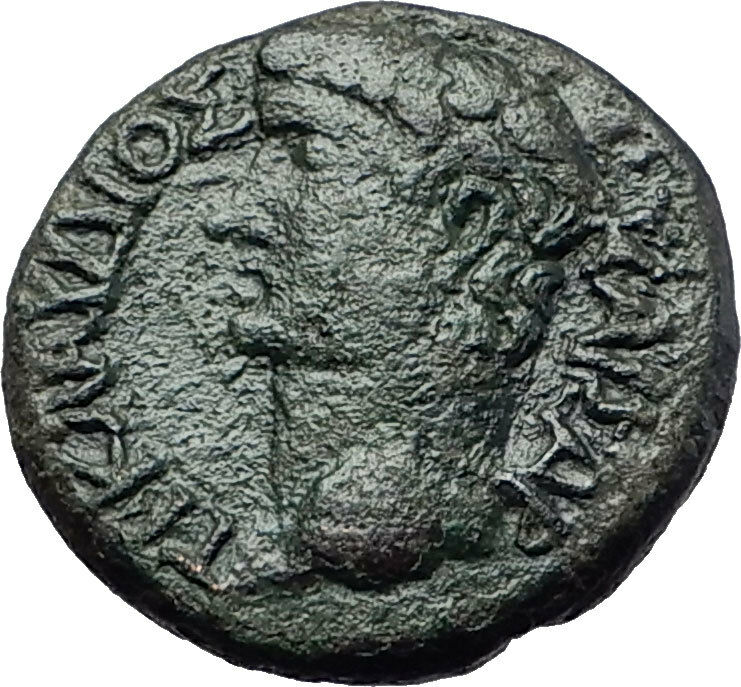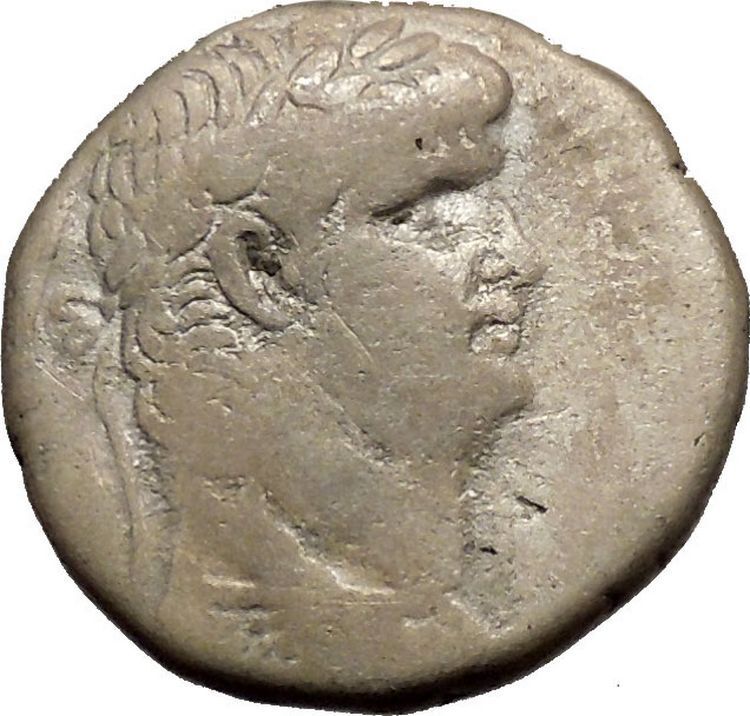|
Gordian III
–
Roman Emperor
: 238-244 A.D. –
Bronze 24mm (6.72 grams) of
Hadrianopolis
in
Thrace
AVT K M ANT ΓΟΡΔΙΑΝΟC AVΓ, Laureate, draped and cuirassed bust right.
AΔPIANOΠΟΛΕΙΤΩΝ,
Nike
standing left, holding wreath and palm.
You are bidding on the exact
item pictured, provided with a Certificate of Authenticity and Lifetime
Guarantee of Authenticity.
In
Greek mythology
,
Nike
was a goddess
who personified
victory
, also known as the Winged Goddess of
Victory. The Roman equivalent was
Victoria
. Depending upon the time of various
myths, she was described as the daughter of
Pallas
(Titan) and
Styx (Water) and the sister of
Kratos
(Strength),
Bia
(Force), and
Zelus
(Zeal). Nike and her siblings were close
companions of Zeus
, the dominant deity of the
Greek pantheon
. According to classical (later)
myth, Styx brought them to Zeus when

the
god was assembling allies for the
Titan War
against the older deities. Nike
assumed the role of the divine
charioteer
, a role in which she often is
portrayed in Classical Greek art. Nike flew around battlefields rewarding the
victors with glory and fame.
Nike is seen with wings in most statues and paintings. Most other winged
deities in the Greek pantheon had shed their wings by Classical times. Nike is
the goddess of strength, speed, and victory. Nike was a very close acquaintance
of Athena
, and is thought to have stood in
Athena’s outstretched hand in the statue of Athena located in the Parthenon.
Nike is one of the most commonly portrayed figures on Greek coins.
Names stemming from Nike include amongst others:
Nicholas
, Nicola, Nick, Nikolai, Nils, Klaas,
Nicole, Ike, Niki, Nikita, Nika, Niketas, and Nico.
Edirne (ancient Hadrianopolis) is a city in
Thrace
, the westernmost part of
Turkey
, close to the borders with
Greece
and
Bulgaria
. Edirne served as the capital city of
the Ottoman Empire
from 1365 to 1457, when
Constantinople
(Istanbul)
became the empire’s new capital. At present, Edirne is the capital of the
Edirne Province
in
Turkish Thrace
. The city’s estimated population
in 2002 was 128,400, up from 119,298 in 2000. It has
consulates
of Bulgaria,
Germany
(Honorary), Greece,
Romania
(Honorary) and
Slovakia
(Honorary). Its sister cities are
Haskovo
and
Yambol
in
Bulgaria
and
Alexandroupoli
in
Greece
.
The city was founded as
Hadrianopolis
, named for the Roman Emperor
Hadrian
. This name is still used in the
Modern Greek
(Αδριανούπολη). The
English
name Adrianople, by which the
city was known until the Turkish Postal Service Law of 1930, has fallen into
disuse. The
Turkish
Edirne, the
Bulgarian
Одрин (Odrin), and the Serbian
Једрене (Jedrene) are adapted forms of the name Hadrianopolis.
Marcus Antonius Gordianus Pius (January
20, 225
–
February
11
, 244
),
known in
English
as Gordian III,
 was was
Roman
Emperor
from 238 to 244. Gordian was the son of
Antonia Gordiana
and his father was an unnamed Roman Senator who died before
238. Antonia Gordiana was the daughter of Emperor
Gordian I
and younger sister of Emperor
Gordian II
.
Very little is known on his early life before becoming Roman Emperor. Gordian
had assumed the name of his maternal grandfather in 238.
Rise to power
Following the murder of emperor
Alexander Severus
in Moguntiacum (modern
Mainz
), the
capital of the
Roman province
Germania Inferior
,
Maximinus Thrax
was acclaimed emperor, despite strong opposition of the
Roman senate
and the majority of the population. In response to what was
considered in Rome as a rebellion, Gordian’s grandfather and uncle, Gordian I
and II, were proclaimed joint emperors in the
Africa Province
. Their revolt was suppressed within a month by Cappellianus,
governor of Numidia
and a loyal supporter of Maximinus Thrax. The elder Gordians died,
but public opinion cherished their memory as peace loving and literate men,
victims of Maximinus’ oppression.
Meanwhile, Maximinus was on the verge of marching on Rome and
the Senate elected
Pupienus
and Balbinus
as joint emperors. These senators were not popular men and the population of
Rome was still shocked by the elder Gordian’s fate, so that the Senate decided
to take the teenager Gordian, rename him Marcus Antonius Gordianus as his
grandfather, and raise him to the rank of
Caesar
and imperial heir.
Pupienus
and Balbinus
defeated Maximinus, mainly due to the defection of several
legions
,
namely the
Parthica II
who assassinated Maximinus. But their joint reign was
doomed from the start with popular riots, military discontent and even an
enormous fire that consumed Rome in June 238. On
July 29
,
Pupienus and Balbinus were killed by the
Praetorian guard
and Gordian proclaimed sole emperor.
Rule
Due to Gordian’s age, the imperial government was surrendered
to the aristocratic families, who controlled the affairs of Rome through the
senate. In 240,
Sabinianus
revolted in the African province, but the situation was dealt quickly. In 241,
Gordian was married to Furia Sabinia
Tranquillina
, daughter of the newly appointed praetorian prefect,
Timesitheus
. As chief of the Praetorian guard and father in law of the
emperor, Timesitheus quickly became the de facto ruler of the Roman
empire.
In the 3rd century, the Roman frontiers weakened against the
Germanic tribes across the
Rhine
and
Danube
, and the
Sassanid
kingdom across the
Euphrates
increased its own attacks. When the Persians under
Shapur I
invaded Mesopotamia
, the young emperor opened the doors of the
Temple of Janus
for the last time in Roman history, and sent a huge army to
the East. The Sassanids were driven back over the Euphrates and defeated in the
Battle of Resaena
(243). The campaign was a success and Gordian, who had
joined the army, was planning an invasion of the enemy’s territory, when his
father-in-law died in unclear circumstances. Without Timesitheus, the campaign,
and the emperor’s security, were at risk.
Marcus Julius Philippus, also known as
Philip the Arab
, stepped in at this moment as the new Praetorian Prefect and
the campaign proceeded. In the beginning of 244, the Persians counter-attacked.
Persian sources claim that a battle was fought (Battle
of Misiche) near modern
Fallujah
(Iraq)
and resulted in a major Roman defeat and the death of Gordian III[1].
Roman sources do not mention this battle and suggest that Gordian died far away,
upstream of the Euphrates. Although ancient sources often described Philip, who
succeeded Gordian as emperor, as having murdered Gordian at Zaitha (Qalat es
Salihiyah), the cause of Gordian’s death is unknown.
Gordian’s youth and good nature, along with the deaths of his
grandfather and uncle and his own tragic fate at the hands of another usurper,
granted him the everlasting esteem of the Romans. Despite the opposition of the
new emperor, Gordian was deified by the Senate after his death, in order to
appease the population and avoid riots.
|





 was
was


